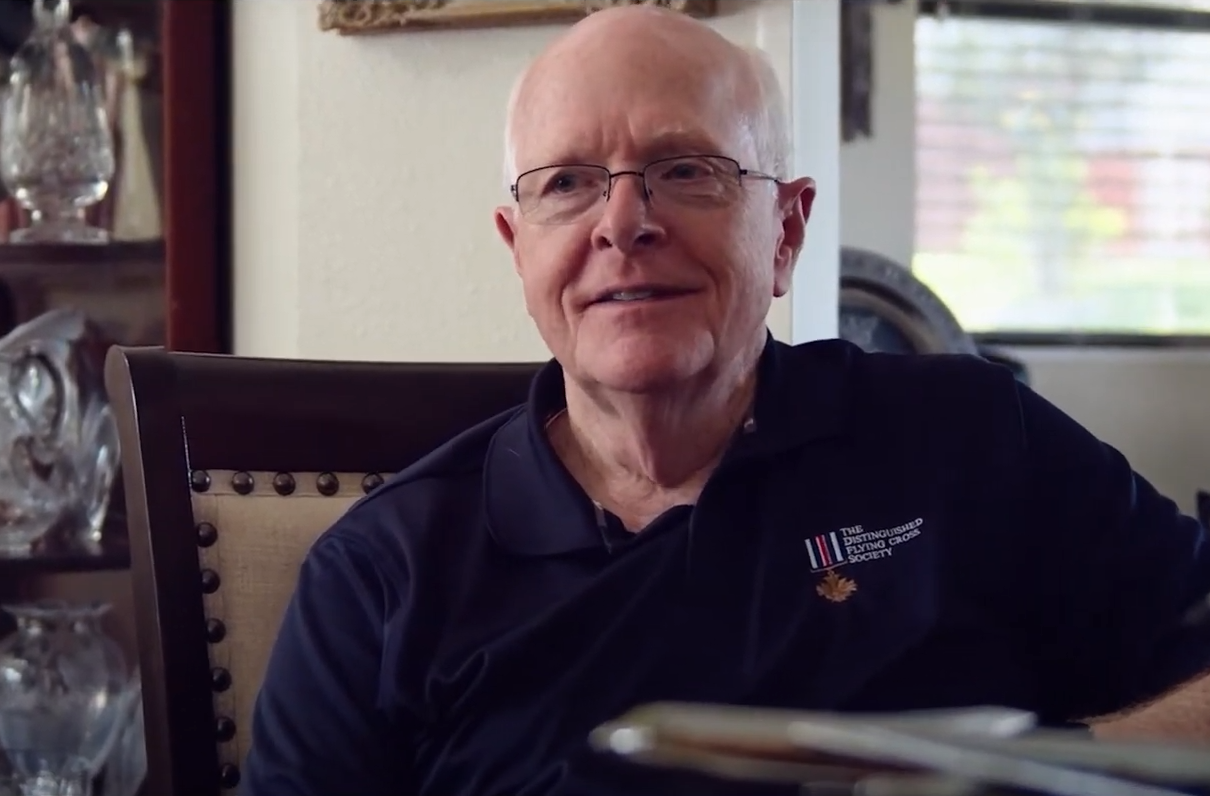By the time Robert Certain bailed from his fiery B-52 long-range bomber and drifted toward Hanoi in December 1972, he knew he would be captured by enemy forces.
He watched the explosions below him during free-fall from 35,000 feet to about 15,000, when his parachute popped open. He knew he was falling into the most heavily defended target in the city.
“I touched down, rolled into the ditch, and I took off down the ditch in a low crawl,” he recalled. “There was a road down the way and a culvert underneath it. I was going to try to get in there and hide, but I didn’t get that far.”
Four militiamen with AK-47s were in the crowd that watched his plane get shot down and spotted Certain. They stripped off his clothes, blindfolded him, and tied him up with rope.
It was the first of 101 days Certain would spend as a prisoner of the Vietnam War.
Certain, a retired Air Force colonel and chaplain who previously served on MOAA’s Board of Directors, spoke about his experience during a virtual “Debrief” presented by Old Guys and Their Airplanes, with support from the Distinguished Flying Cross Society. The presentation included a short film about his experience and a live question-and-answer session streamed by the South Dakota Air and Space Museum, the National Minuteman Missile Historic Site, and other groups.
The ordeal was among a long line of experiences that led Certain to become an Episcopal priest and serve as a chaplain to guide troops in distress.
Certain was trained as a navigator-bombardier on the B-52 Stratofortress after commissioning into the Air Force in 1969. He flew about 100 combat missions in Southeast Asia, including Guam and Thailand.
On Dec. 18, 1972, his crew was part of a massive air strike effort ordered by President Richard Nixon to knock out enemy supplies, communications equipment, and transportation lines in Hanoi. In the briefing the morning of the airstrike, Certain’s crew was told there was a 10% shootdown rate and, if they were shot down, they would be on their own.
The crew took off and didn’t register any threats through their 100-millimeter scopes, so they opened the bombardier doors. That’s when they were struck, and a fire broke out in the forward wheel well directly behind Certain’s position in the plane.
Not everyone in the crew survived the strike. Those who did immediately bailed from the aircraft.
By the following day, Certain learned there were two partial crews of B-52s captured. The captured Americans were led into a news conference where European news crews photographed their faces, giving Certain hope he would be going home soon.
[RELATED: Bombardier’s Road to Priesthood Took a Turn in Hanoi Prison]
He said he made sure the crews got photographs of his face, but he refused to speak.
Meanwhile, Certain’s wife and other family members were summoned to a television station in Atlanta to watch the video of the news conference. They could see that he was alive and walking but not talking.
“They wanted me to call for an end on the war,” Certain said during the interview, explaining his defiance. “They wanted me to call on the president to stop the bombing and to say it was a terrible thing to be doing. I wasn’t about to do that.”
Certain groups Vietnam prisoners into three groups. He considers himself lucky to be part of the third group captured for a shorter amount of time and didn’t suffer torture like the first group.
“The longest-held prisoners of war were men of deep faith,” Certain said. “They had been through the dark night of the soul and had come out on the other side. Then there’s a middle group that had gotten as far as the night of the soul but hadn’t resolved it yet. And then there were us new guys who were right at the tail end under a year.”
[RELATED: 4 Vietnam POWs Share Lessons Learned]
During his time in captivity, Certain spoke with other POWs who told him they cheered when they saw his B-52 coming down because they knew when American aircraft reached Hanoi, the war would be over soon.
When Certain was released in March, he first flew to the Philippines to get a uniform and medical assessment. He was transported to Scott Air Force Base in Illinois, where his parents greeted him.
While on active duty he went on to seminary to earn his Master of Divinity and Doctor of Ministry degrees from the School of Theology at the University of the South. He served on active duty until 1977 and served 22 years in the Air Force Reserve, retiring in 1999.
Certain served as a parish priest at churches across the country, including officiating and preaching for the Ford family at President Gerald Ford’s funeral in January 2007.
MOAA Knows Why You Serve
We understand the needs and concerns of military families – and we’re here to help you meet life’s challenges along the way. Join MOAA now and get the support you need.

